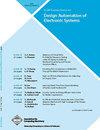MOEA/D vs. NSGA-II: A Comprehensive Comparison for Multi/Many Objective Analog/RF Circuit Optimization Through A Generic Benchmark
IF 2.2
4区 计算机科学
Q3 COMPUTER SCIENCE, HARDWARE & ARCHITECTURE
ACM Transactions on Design Automation of Electronic Systems
Pub Date : 2023-09-28
DOI:10.1145/3626096
引用次数: 0
Abstract
Thanks to the enhanced computational capacity of modern computers, even sophisticated analog/RF circuit sizing problems can be solved via electronic design automation (EDA) tools. Recently, several analog/RF circuit optimization algorithms have been successfully applied to automatize the analog/RF circuit design process. Conventionally, metaheuristic algorithms are widely used in optimization process. Among various nature-inspired algorithms, evolutionary algorithms (EAs) have been more preferred due to their superiorities (robustness, efficiency, accuracy etc.) over the other algorithms. Furthermore, EAs have been diversified and several distinguished analog/RF circuit optimization approaches for single-, multi-, and many- objective problems have been reported in the literature. However, there are conflicting claims on the performance of these algorithms and no objective performance comparison has been revealed yet. In the previous work, only a few case study circuits have been under test to demonstrate the superiority of the utilized algorithm, so a limited comparison has been made for only these specific circuits. The underlying reason is that the literature lacks a generic benchmark for analog/RF circuit sizing problem. To address these issues, we propose a comprehensive comparison of the most popular two evolutionary computation algorithms, namely Non-Sorting Genetic Algorithm-II (NSGA-II) and Multi-Objective Evolutionary Algorithm based Decomposition (MOEA/D), in this paper. For that purpose, we introduce two ad-hoc testbenches for analog (ANLG) and radio frequency (RF) circuits including the common building blocks. The comparison has been made at both multi- and many- objective domains and the performances of algorithms have been quantitatively revealed through the well-known Pareto-optimal front quality metrics.MOEA/D与NSGA-II:基于通用基准的多/多目标模拟/射频电路优化的综合比较
由于现代计算机的计算能力增强,即使是复杂的模拟/射频电路尺寸问题也可以通过电子设计自动化(EDA)工具来解决。近年来,一些模拟/射频电路优化算法已成功地应用于模拟/射频电路设计过程的自动化。传统上,元启发式算法被广泛用于优化过程。在各种受自然启发的算法中,进化算法(EAs)由于其鲁棒性、效率、准确性等优势而受到其他算法的青睐。此外,ea已经多样化,并且文献中已经报道了针对单目标、多目标和多目标问题的几种不同的模拟/射频电路优化方法。然而,对这些算法的性能有相互矛盾的说法,目前还没有发现客观的性能比较。在之前的工作中,只有少数案例研究电路进行了测试,以证明所使用算法的优越性,因此仅对这些特定电路进行了有限的比较。潜在的原因是,文献缺乏模拟/射频电路尺寸问题的通用基准。为了解决这些问题,本文提出了两种最流行的进化计算算法,即非排序遗传算法- ii (NSGA-II)和基于分解的多目标进化算法(MOEA/D)的综合比较。为此,我们介绍了模拟(ANLG)和射频(RF)电路的两个特设测试台,包括常见的构建块。在多目标和多目标领域进行了比较,并通过著名的帕累托最优前端质量指标定量地揭示了算法的性能。
本文章由计算机程序翻译,如有差异,请以英文原文为准。
求助全文
约1分钟内获得全文
求助全文
来源期刊
CiteScore
3.20
自引率
7.10%
发文量
105
审稿时长
3 months
期刊介绍:
TODAES is a premier ACM journal in design and automation of electronic systems. It publishes innovative work documenting significant research and development advances on the specification, design, analysis, simulation, testing, and evaluation of electronic systems, emphasizing a computer science/engineering orientation. Both theoretical analysis and practical solutions are welcome.

 求助内容:
求助内容: 应助结果提醒方式:
应助结果提醒方式:


